Quy trình cung cấp dịch vụ vận chuyển hàng bưu kiện của các doanh nghiệp vận chuyển hàng bưu kiện tại Việt Nam, Mỗi kiện hàng phải trải qua rất nhiều công đoạn thủ công trước khi đến với người nhận cuối cùng. Vì vậy, việc đóng gói hàng hóa trước khi giao cho nhà vận chuyển có vai trò và ý nghĩa cực kỳ quan trọng.
LIÊN HỆ NGAY ĐỂ NHẬN BÁO GIÁ CỤ THỂ
📦 Hotline Liên Hệ Vận Chuyển
🧭 Miền Trung
Hướng dẫn cách đóng gói hàng vận chuyển hàng bưu kiện an toàn
Để đảm bảo quyền lợi của khách hàng, trên cơ sở kinh nghiệm của mình, công ty vận chuyển hàng hóa proship.vn đưa ra một số tư vấn và hướng dẫn về việc đóng gói hàng hóa để hạn chế tối đa những rủi ro không mong đợi trong quá trình vận chuyển cho khách hàng như sau:
Đóng gói các hàng hóa thông thường
Sử dụng vật liệu độn và nhồi
Đặt một lớp vật liệu đệm sâu ít nhất 5cm dưới đáy hộp. Hàng nhạy cảm và hàng nặng hơn đòi hỏi nhiều lớp đệm dưới đáy, thành bên và trên nóc hộp.
Gói từng vật đơn lẻ
Với vật liệu đệm và đặt vào giữa hộp. Đảm bảo rằng mỗi vật phải cách rời lẫn nhau trong hộp và phải đệm ở thành bên, góc, nóc và đáy hộp
Lấp thật đầy các khoảng trống bằng vật độn thêm và bổ dung một lớp đệm khác trên nóc hộp
Vật liệu độn cung cấp sự bảo vệ có hạn chế cho các vật kim loại nặng, như các thành phần kim loại tự động. Hàng dạng này nên được vận chuyển trong hộp gia cố nặng. Các thành phần nhỏ, lỏng lẻo phải được đặt trong túi nhựa hạng nặng được dán nhãn trước khi được đặt vào hộp ngoài.
Nguyên tắc đóng gói
Kiện hàng phải có ít nhất một bề mặt nhẵn, phẳng để đảm báo dán được địa chỉ người nhận lên trên. Nếu kiện hàng được đóng bằng bao dứa, hãy đảm bảo chúng được đóng gói thêm 1 lớp thùng carton bên ngoài.
Đảm bảo không có mũi nhọn hay cạnh nhô. Bịt những bề mặt như vậy bằng những panen gấp hay miếng lót buộc chặt làm cùn chúng. Sau đó bịt chặt kiện hàng bằng cách dùng ba dải băng nhựa nhạy áp lực rộng 5cm trên nóc và dưới đáy gói..
Không nên sử dụng giấy, vải để gói, dây thừng để buộc hàng (nên sử dụng băng keo dán, dây đai nhựa) vì những hình thức bao gói này rất dễ bị ướt, rách, bục trong quá trình vận chuyển.
Khi hộp bọc đóng lại, đặt một dải băng trên khe nối và hai dải băng khác dọc cạnh hộp để hỗ trợ. Gói, đặc biệt là ấn phẩm càng nặng thì càng cần nhiều băng. Tốt hơn nếu buộc dây nhựa chịu lực nặng ở ít nhất hai hướng.
Hóa đơn gửi hàng nên được bỏ vào bên trong thùng hàng. Đồng thời có một bản copy hóa đơn này để cung cấp cho 247 gửi kèm với hàng hóa.
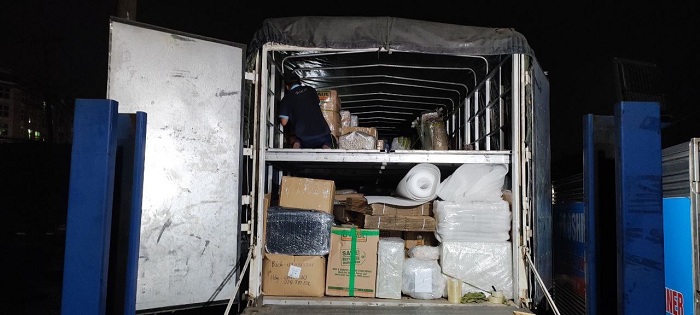
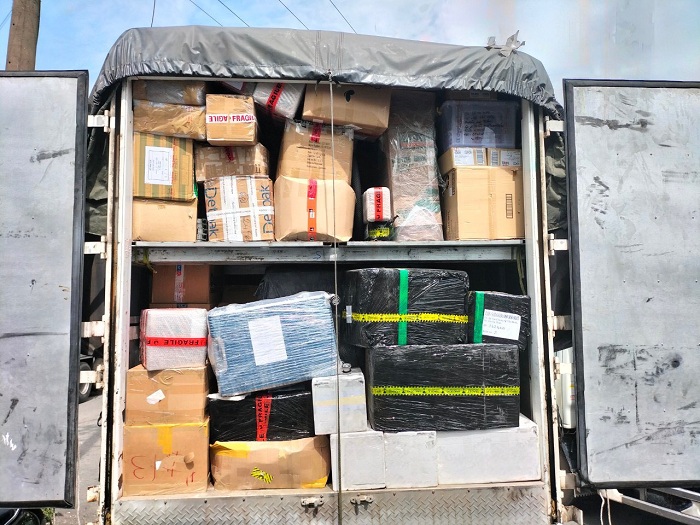
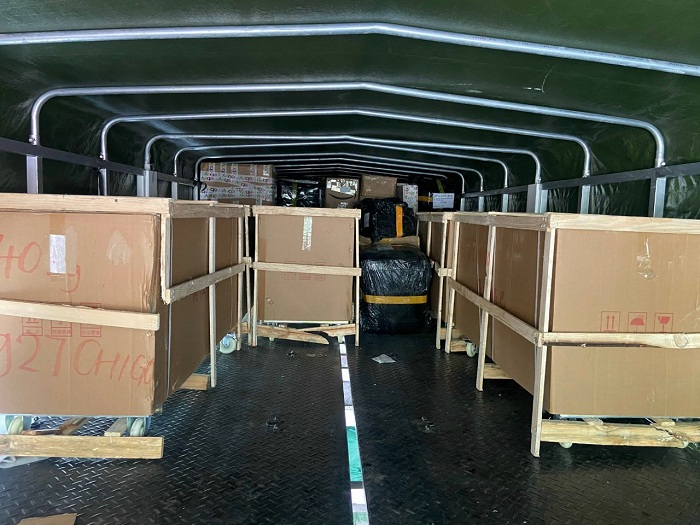
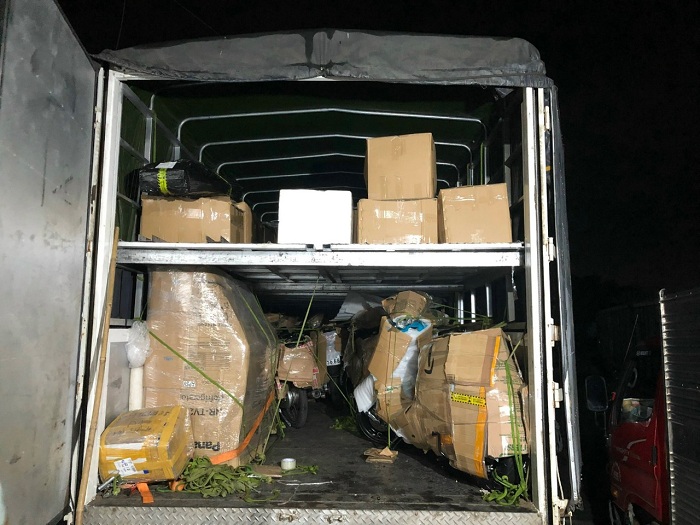
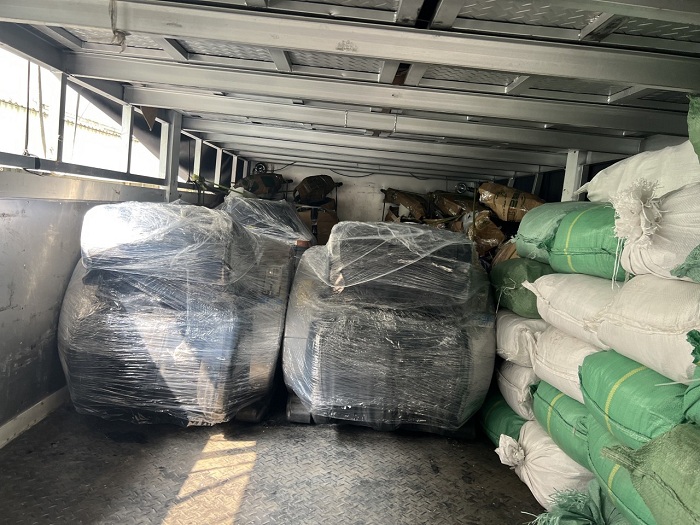
Lưu ý:
- Trước đóng gói niêm phong hàng, vui lòng kiểm tra lại địa chỉ người nhận đã được dán trên kiện hàng với đầy đủ thông tin (tên người nhận, địa chỉ liên lạc, số điện thoại..). Điều này sẽ giúp ích cho việc chuyển hàng tới người nhận được nhanh chóng.
. Chọn hộp chứa hàng vận chuyển đúng kích thước hàng hoá của bạn hoặc dùng vật liệu gói hàng bên trong phù hợp để giữ cho các mặt hàng không di chuyển bên trong gói hàng. Dùng các vật liệu không bị xẹp do trọng lượng của các mặt hàng nặng. Ví dụ: giấy gói hàng loại dày được lót chặt có thể dùng để lấp những khoảng trống trong hộp chứa hàng vận chuyển.
- Đóng gói các hàng hóa đặc biệt
- Cách đóng gói đối với hàng điện tử, link kiện điện tử, hàng giá trị cao
Hàng hóa thuộc dạng này bao gồm : máy tính, máy tính xách tay, điện thoại các loại, máy chụp hình, máy quay phim, màn hình LCD, Ram/chip, các thiết bị điện tử khác…
Thông thường đây là những sản phẩm rất dễ vỡ và dễ bị hư hỏng. Trong quá trình nâng, chất hàng hóa lên các phương tiện vận chuyển như máy bay, ô tô, sự va chạm mạnh có thể tác động vào những thiết bị này gây cho những thiết bị này bị hư hỏng, đổ vỡ. Vì vậy chúng cần phải được đóng gói theo một hình thức đặc biệt để hạn chế các tác động này.
Sử dụng chất liệu đệm + đóng gói bên ngoài bằng thùng carton, thùng gỗ
Chất liệu đệm là Mút, xốp, Bọt Mềm …
Bọt mềm là những tấm lót đặc biệt như polyetylen (PE), polyuretan (PU), và polypropylen (PP) có những đặc tính đệm có nhiều tác động.
Những miếng bọt này bảo vệ các mặt hàng dễ vỡ khỏi va chạm và ảnh hưởng trong các điều kiện xử lý gói hàng bình thường và duy trì mức độ bảo vệ này trong toàn bộ quá trìnhphân phối.
Lưu ý:
- Với các hàng hóa giá trị cao và có khối lượng bao bì > 3kg và kích thước của 1 chiều bất kỳ > 30 cm nhất thiết phải được đóng thùng gỗ kín và nên mua bảo hiểm vận chuyển của nhà cung câp dịch vụ.
Cách đóng gói đối với các hàng là chất liệu thuỷ tinh, dễ vỡ như nước hoa, bóng đèn, gốm sứ, tượng,…
Sử dụng chất liệu là tấm bọt khí cuộn kín sản phẩm, còn gọi là giấy gói Bubble . Các bọt khí này có chức năng đàn hồi chống va đập
Giấy gói Bubble là vật liệu gói được làm từ các bóng khí cao 1/2 inch (1,27 cm) giữa hai tấm nilon khi chúng được gắn vào nhau. Quá trình gắn này cho phép nilon xốp tạo đệm để tránh va chạm.
Giấy gói bubble ô lớn có khả năng đệm, và có thể được gói ngoài hầu hết các sản phẩm, không kể hình dạng hoặc kích thước.
Khi sử dụng giấy gói bubble ô lớn, dùng vài lớp để đảm bảo toàn bộ sản phẩm được đệm, và đặc biệt chú ý đến việc bảo vệ các góc và cạnh. Khi gói nhiều hàng hoá, bọc riêng từng mặt hàng. Những mặt hàng dễ vỡ cần phải đặt cách nhau và cách các góc, các cạnh, mặt trên và mặt dưới thùng.
Mỗi mặt hàng cần được bọc bằng tấm bọt có kích thước ít nhất là hai inch (5,08 cm) và đặt cách vách thùng hai inch (5,08 cm). Điều này sẽ giúp cho các sản phẩm không bị hư hỏng do va chạm vào nhau và bảo vệ sản phẩm không bị rung do lực truyền vào từ ngoài thùng. Sử dụng đủ tấm bọt để bảo đảm không di chuyển mặt hàng bên trong thùng khi lắc thùng.
Sử dụng hộp kép
Đóng hộp kép hoặc đóng nhiều hộp là một phương pháp hiệu quả để bảo vệ các mặt hàng dễ vỡ ở những nơi mà việc đóng gói không phù hợp để vận chuyển qua các hãng vận tải như UPS sử dụng hệ thống phân phối thủ công và tự động.
Đảm bảo gói hàng ban đầu ở tình trạng tốt và nguyên vẹn. Nên thay thế hoặc sửa chữa các miếng bọt bị nứt hoặc gãy. Đảm bảo rằng mặt hàng không thể di chuyển trong gói hàng ban đầu.
Chọn một hộp chứa hàng vận chuyển mới có độ bền được khuyến nghị lớn hơn ít nhất 6 inch (15,24 cm) so với kích thước của thùng ban đầu. Lót xuống đáy của hộp chứa hàng vận chuyển mới bằng hai hoặc ba inch (5,08 cm đến 7,62 cm) vật liệu ép lỏng (đối với hàng hoá có khối lượng lên đến 10 lbs/ 4,54 kg), giấy gói bubble (đối với hàng hoá có khối lượng lên đến 50 lbs/22,68kg), bọt phủ, tấm phủ polyetylen hoặc các vật liệu lót khác.
Đặt thùng của nhà sản xuất ban đầu ở trên vật liệu lót và ở giữa hộp chứa hàng vận chuyển và đặt tấm lót xung quanh năm cạnh còn lại. Dán kín các nắp hộp bằng vật liệu và phương pháp được khuyên dùng.
Cách đóng gói đối với chai lọ chứa chất lỏng
Các bình, chai lọ chứa chất lỏng phải được bị kín không cho chất lỏng chảy ra ngoài dù bị để dốc ngược. Các bình, lọ chứa chất lỏng này phải được bảo quản đặt trong một thùng gỗ kín hoặc thùng thiếc, có khoảng trống ở giữa để lèn vật liệu hút chất lỏng (mùn cưa) đảm bảo hút hết chất lỏng trong trường hợp bình, lọ bên trong bị bể vỡ. Nếu nhiều chai lọ để trong một thùng phải được ngăn cách bởi vách ngăn hoặc dùng các vật liệu có độ đàn hồi chèn kín giữa các khoản trống để không cho xê dịch sản phẩm. Sử dụng thêm các vật liệu chèn như: tấm bọt khí, mút, xốp, hạt nở …
Các đóng gói đối với các vật phẩm cuộn tròn như: Tranh vẽ, bản đồ , …
Tranh vẽ, bản đồ, nên được cuộn tròn và cho vào ống nước bằng nhựa và bịt kín 2 đầu ống.
Sách báo, tạp chí, catalouge
Ấn phẩm như tạp chí hay các xuất bản phẩm khác phải được đóng gói chính xác để tránh dịch chuyển trong quá trinh vận chuyển làm cho chúng bị bẩn và hư hại. Buộc hay cột bằng dải thun tất cả các ấn phẩm, sau đó lót đệm dưới đáy, thành bên và nóc hộp với vật độn..
